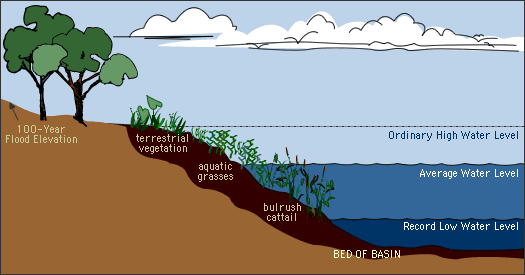 |
 |
ENFORCING SHORELAND AND WATER-RELATED LAWS
![]()
- Who should I call when I think a water regulation is being violated?
- Can I report violations anonymously?
- What will be done once a violation is reported and confirmed?
- How can we encourage people to "do the right thing?"
- Who can I call if I have questions or a problem related to enforcing shoreland and water-related laws?
- What are some additional resources about enforcing shoreland and water-related laws?
Who should I call when I think a water regulation is being violated?
Minnesota water law requires that people obtain permits before appropriating water or physically changing shorelines, lakes, or riverbeds. The primary agency regulating activities taking place below the Ordinary High Water Level (OHW) of lakes and rivers is the Minnesota Department of Natural Resources (MDNR). If you think a water regulation is being violated, call your area MDNR Conservation Officer (CO), who will assess and respond to potential water violations. Check your telephone listing or call your county sheriff dispatcher to identify your local CO. Conservation Officers work out of their homes; the listed phone numbers are their home phones. If you don’t reach the CO, leave a message. If the concern is urgent, call 911.
The MDNR Enforcement Division is responsible for enforcing state MDNR laws and regulations (e.g., wild rice harvest, public waters and public waters wetlands alterations, fish and game violations). The MDNR also cooperates with Turn In Poachers (TIP), a private, non-profit organization dedicated to stopping poachers.
County governments regulate activities above the OHW, such as tree removal or timber harvesting. Some counties have more stringent shoreland regulations than others. To get a copy of the shoreland regulations for your county, contact your Planning and Zoning Department, your county Water Plan Coordinator, or other appropriate local authority.
Filling or draining wetlands may require a permit from the MDNR or the U.S. Army Corps of Engineers. If you believe you know of a violation, contact your MDNR Conservation Officer, your local planning and zoning department, or the MDNR Area Hydrologist (see the “Who to Contact” section of the Minnesota Shoreland Management Resource Guide Web site for contact information).
Can I report violations anonymously?
YES! The information you give to a MDNR Conservation Officer or other regulatory official is confidential. The Minnesota Data Privacy Rules prevent your name from being released.
What will be done once a violation is reported and confirmed?
Depending on the area of the state in which you live and the type of violation, enforcement may vary. Counties often send people who illegally alter shoreline before the Planning Commission. After talking to the Planning Commission, violators may be required to pay a late fee or penalty, and purchase the appropriate permits. If a citation is issued, the violation is a misdemeanor. Violators may have to remediate the site in some way. In some cases, structures may need to be rebuilt within the guidelines of county land use ordinances. Other agencies charged with enforcement, such as the MDNR or the U.S. Army Corps of Engineers, may use fines, imprisonment, remediation, restoration, or a combination of these approaches to address violations.
How can we encourage people to “do the right thing?”
Education, incentives, and regulations help to protect and improve lakes and rivers. Education helps people to understand their choices, incentives motivate them, and regulations are minimum guidelines. When people are unaware of the guidelines or unwilling to abide by the rules and respect water as a common resource, Minnesota’s laws and ordinances can be effective motivators.
Who can I call if I have questions or a problem related to enforcing shoreland and water-related laws?
Check your local telephone listing, the “Who to Contact” section of the Minnesota Shoreland Management Resource Guide Web site, www.shorelandmanagement.org, or the Web sites listed below for:
- Your local Conservation Officer
- Your county Water Plan Coordinator
- City, township, or county Planning and Zoning
- Your Soil and Water Conservation District (SWCD) (www.maswcd.org)
- Minnesota Department of Natural Resources (MDNR) (www.dnr.state.mn.us)
What are some additional resources about enforcing shoreland and water-related laws?
- Work That Can Be Done Without A Public Waters Work Permit. 2002. Minnesota Department of Natural Resources, Division of Waters
- Minnesota Water Rights and Regulation. 1996. E. Garvey, P. Gersmehl, and D. Brown. Water Resources Research Center
- Lakescaping for Wildlife and Water Quality, Appendix J: Minnesota Lakeshore Rules & Regulations. 1999. C.L. Henderson, C.J. Dindorf, and F. J. Rozumalski, Minnesota Department of Natural Resources
- Life on the Edge: Owning Waterfront Property. 1998. M.D. Dresen and R. M. Korth, Wisconsin Lakes Partnership
